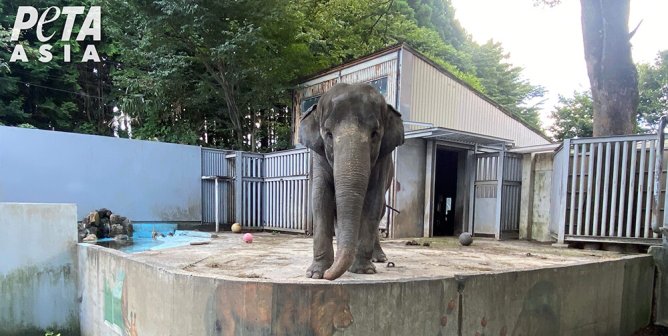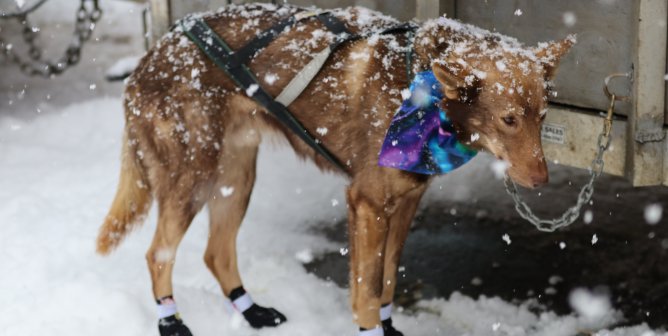Traveling Animal Acts: Shameful Shows
Animals used in traveling shows and menageries are often subjected to severe abuse in order to force them to provide “entertainment” at county and state fairs, shopping malls, theme parks, schools, flea markets, nursing homes, birthday parties, and trade shows. Typical acts include petting zoos, “performing” primates, donkey basketball games, pig racing, and pig diving. At some events, members of the public can pay to have their photographs taken with tiger and lion cubs. The variations are limited only by the imagination of the exhibitors, who are looking to make an easy dollar. Baby animals are continuously bred for these shows and then discarded.
Training, Transport, and Display Are Harmful to Animals
Rigorous training methods involving electric shocks, beatings, and food deprivation are used to force animals to perform acts that are unnatural and meaningless to them.
Pig races at fairs are all too familiar, and they’ve taken on a new twist at events in which potbellied pigs are forced to swim in pools. Pigs are not aquatic animals by nature, and according to one pig caretaker, “a pig in the water is almost completely helpless and extremely stressed.”1 These highly intelligent, sensitive animals are also stressed by the constant travel and the large, boisterous crowds.
Every year, schools, civic clubs, and recreation departments use donkey basketball games as fundraisers. During these games, donkeys are dragged around a court and mistreated by participants who have no animal-handling experience. “Uncooperative” animals are often punched, kicked, whipped, and screamed at, and many animals are prohibited from eating or drinking before games in order to prevent “accidents.”
Animals used in traveling acts are almost constantly confined to tiny transport cages or trailers. They suffer in extreme temperatures and are not provided with adequate food and water. The Zoo, a traveling animal exhibit run by Robert Engesser, has been repeatedly cited by the U.S. Department of Agriculture (USDA) for inadequate animal care practices, including failure to provide proper diets, veterinary care, and environmental enrichment. On one visit, the inspecting veterinarian reported algae in the water buckets, a lion cub who was being fed inappropriate milk replacers, and a baboon who was being kept in solitary confinement and who was rolling her head and pacing, behaviors that indicate extreme mental distress.2
Without exercise, animals become listless and prone to illness, and as a reaction to stress and boredom, many resort to self-mutilation. Three 11-day-old tiger cubs who were being used for photo opportunities by a traveling zoo called Perry’s Exotic Petting Zoo became listless, nauseated, and dehydrated while on exhibit in Thornton, Colorado. They died without receiving veterinary care. The USDA inspector investigating the deaths wrote, “Transportation and handling stresses cannot be ruled out as contributing to their failed health.”3 Undercover video showed that after the Amarillo Wildlife Refuge forced a tiger cub named Ziggy to work a six-hour photo shoot in the blazing-hot parking lot of a Sam’s Club store in Texas, the cub developed painful blisters on his paws from standing on the hot pavement all day.
While taking part in photo shoots with animals and watching them perform may seem like harmless fun for kids, it is anything but. Barbara Boat, Ph.D., associate professor of psychology at the University of Cincinnati’s Children’s Hospital Medical Center cautions, “An industry based upon the use and abuse of wild animals has no place in either the education or entertainment of young children. We need to be teaching empathy, compassion, and sensitivity to the interconnectedness of all life, not abusive domination of others.”4
Incidents in which animals attack spectators are common. A woman sought hospital treatment after she was bitten by an African lion cub exhibited by G.W. Exotic Animal Foundation at a Texas mall, where patrons were allowed to pet and interact with the lion.5 A 4-year-old Florida girl suffered serious injuries, including a partially severed ear, when she was attacked by a cougar at a birthday party. The cougar had been provided by Wild Animal World, which had been cited at least twice previously for similar attacks.6
Please visit PETA.org to find out more about these incidents and to see the track records of other traveling exhibits, which indicate improper care and dangerous handling of animals.
Licensed but Not Regulated
The Animal Welfare Act (AWA) requires that animal exhibitors be licensed by the USDA’s Animal and Plant Health Inspection Service. This is supposed to ensure that exhibitors meet the AWA’s minimal requirements regarding animal care. However, the USDA cannot realistically regulate or enforce the humane treatment of animals who are continuously on the road in an effective manner.
What You Can Do
When you hear that an animal show is coming to town, you can take the following steps:
- If you have advance notice, voice your concerns to the fair organizers, the shopping mall manager, or other promoters. Give them the facts about behind-the-scenes abuse and stress the risk of injury to spectators. Have your friends and neighbors do the same, and make it clear that the fair, mall, etc., will be boycotted if the show is booked. Take your concerns to the mayor or county council. Ask your local humane society to use its influence to ban the show.
- If the show is booked in spite of your efforts, be on the scene when the animals arrive to look for violations of the Animal Welfare Act as well as local and state cruelty laws. Watch the animals for signs of poor health, such as listlessness, sores, missing hair, lameness, or self-mutilation. Take note of sanitation conditions, cage size (by law, cages must be large enough to allow animals to stand up, lie down, and turn around), and food, water, and shade availability. Take photographs or video footage of the animals and cages. If you see possible violations, try to get a sympathetic veterinarian to verify your findings and report your observations to your local animal warden or humane officer, the state department of agriculture, and the USDA. Insist that the animals and their living conditions be examined and that violations of the law be corrected.
- Organize a demonstration. Notify the media in time for them to cover your protest. If you don’t already know which reporters are sympathetic to animal issues, call local papers and TV stations and ask to speak to a reporter who is interested in animal issues. Five people distributing leaflets will go a long way toward educating the public, but media coverage of 20 people with picket signs is a huge success! (Write to PETA for a supply of leaflets.)
- Find out where the show is going when it leaves your community. Contact humane societies and activists in that area, let them know what you did in your area, and ask them to do the same. You can obtain a list of animal rights groups in a specific state by calling PETA’s International Grassroots Campaigns Department.
- Write a letter to the editor urging people not to patronize animal shows.
- Call PETA and request an “Animal Display Ban” pack for tips on getting animal acts banned in your community.
Don’t allow the promoters of animal acts to pass off their exploitation of animals as entertainment. By educating others and showing that cruelty to animals is neither fun nor ethical, you can help stop animal exploitation.
References
1Richard D. Hoyle, letter to PETA, 18 Aug. 2003.
2John Guedron, D.V.M., USDA Inspection Report 58-C-0295, 24 May 2001.
3Daryl Burden, D.V.M., USDA Inspection Report 42-C-0101, 27 Feb. 2003.
4Barbara Boat, Ph.D., letter to PETA, 23 Apr. 2004.
5“Lion Injures Mall Patron, Placed in Quarantine,” San Angelo Standard Times 23 Jan. 2007.
6David OValle, “Cougar Mauls Girl at Birthday Party,” The Miami Herald 7 Dec. 2006.







